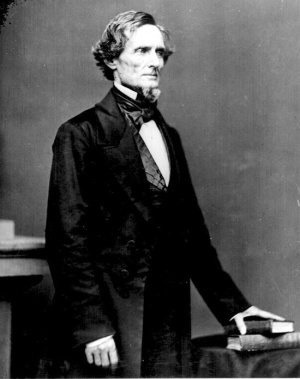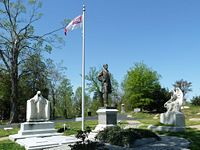Jefferson Davis
 Jefferson F. Davis (1808-1889) - born 3 Jun 1808 in Christian County, Kentucky the last of the ten children of Samuel Emory Davis and his wife Jane Cook. He died in New Orleans on 6 Dec 1889, at the age of 81. His funeral was one of the largest ever staged in the south. He is buried at Hollywood Cemetery in Richmond, Virginia. In 1813, Davis began his education together with his sister Mary, attending a log cabin school a mile from their home. Two years later, Davis entered the Catholic school of Saint Thomas Aquinas in Washington County, Kentucky. He went on to Jefferson College at Washington, Mississippi in 1818, and to Transylvania University at Lexington, Kentucky in 1821. Military YearsIn 1824, Davis entered the United States Military Academy at West Point, New York as a cadet. He graduated as a Second Lieutenant in June 1828, 23rd in a class of 33. He was assigned to the 1st U.S. Infantry and stationed at Fort Crawford (1), Wisconsin. In 1829 he was reassigned to Fort Winnebago, Wisconsin. In 1831 he contracted pneumonia and returned to Fort Crawford (1). His first combat assignment was during the Black Hawk War of 1832, after which he was assigned by Colonel Zachary Taylor, to escort Black Hawk himself to prison at Jefferson Barracks. In 1833, Davis was promoted to First Lieutenant of the 1st U.S. Dragoons and made a regimental adjutant. In 1834 he was transferred to Fort Gibson. Jefferson Davis had fallen in love with Colonel Taylor's 16-year-old daughter, Sarah Knox Taylor. Her father did not approve of the match and Davis resigned his commission to marry Miss Taylor at the house of her aunt near Louisville, Kentucky. The marriage proved short. The newlyweds both contracted malaria, and Davis's wife died three months after the wedding at the Louisiana home of his sister. Davis recovered, sailing for Havana, Cuba, and then to New York City. In 1836, he returned to Brierfield Plantation in Warren County, Mississippi. He unsuccessfully sought public office until 1844 when he was elected to the U.S. House of Representatives. He married again in 1845 to socially prominent Varina Howell. Mexican WarIn 1846 he resigned his seat in the U.S. House of Representatives to raise a volunteer regiment for the Mexican War. In September of 1846, he participated in the successful siege of Monterrey, Mexico. He fought bravely at the Buena Vista, Mexico on February 22, 1847, and was shot in the foot. Because of his war service, the governor of Mississippi appointed Davis to fill out the Senate term of the late Jesse Speight. PoliticsThe Senate made Davis chairman of the Committee on Military Affairs. When his term expired, he was elected to the same seat (by the Mississippi legislature, as the Constitution mandated at the time). He hadn't served a year when he resigned (in September 1851) to run for the governorship of Mississippi on the issue of the Compromise of 1850, which Davis opposed. This election bid was unsuccessful, as he was defeated by Henry Stuart Foote by 999 votes. In the weeks leading up to the U.S. presidential election, 1852, he campaigned in a number of Southern states for Democratic candidates Franklin Pierce and William R. King. Pierce won the election and made Davis his Secretary of War. Davis's term ended with Pierce's, so he ran successfully for the Senate, and re-entered it on March 4, 1857. His renewed service in the Senate was interrupted by an illness that threatened him with the loss of his left eye. Still nominally serving in the Senate, Davis spent the summer of 1858 in Portland, Maine. On the Fourth of July, he delivered an anti-secessionist speech on board a ship near Boston. He again urged the preservation of the Union on October 11 in Faneuil Hall, Boston, and returned to the Senate soon after. On February 2, 1860, as secessionist clamor in the South grew ever louder, Davis submitted six resolutions in an attempt to consolidate opinion regarding states' rights, and to further his own position on the issue. Abraham Lincoln, a known opponent of slavery, won the presidency that November. Matters came to a head, and South Carolina seceded from the Union. On 21 Jan 1861 he announced the secession of Mississippi, delivered a farewell address, and resigned from the Senate. The ConfederacyFour days after his resignation, Davis was commissioned a Major General of Mississippi troops. On February 9, 1861, a constitutional convention at Montgomery, Alabama named him provisional president of the Confederate States of America and he was inaugurated on February 18. In meetings of his own Mississippi legislature, Davis had argued against secession; but when a majority of the delegates opposed him, he gave in. He immediately appointed a Peace Commission to resolve the Confederacy's differences with the Union (USA). Not wishing, however, to rely on paths of negotiation, he appointed General P.G.T. Beauregard to lead Confederate troops in the vicinity of Charleston, South Carolina. The government moved to Richmond, Virginia in May, 1861, and Davis and his family took up his residence there at the White House of the Confederacy on May 29. Davis was elected to a six-year term as president of the Confederacy on November 6, 1861. He had never served a full term in any elective office, and this was not destined to be the first. He was inaugurated on February 22, 1862. On June 1, he assigned General Robert E. Lee to command the Army of Northern Virginia, the main Confederate army in the Eastern Theater. That December, he made a tour of Confederate armies in the west of the country. Davis has received criticism over his conduct of the military affairs of the Confederacy. Until late in the war, he resisted efforts to appoint a general-in-chief, essentially handling those duties himself; on January 31, 1865, Lee assumed this role, but it was far too late for him to establish a grand strategy that could achieve success. Davis was responsible for the strategy of defending all Southern territory with ostensibly equal effort, which diluted the limited resources of the South and made it vulnerable to coordinated strategic thrusts by the Union into the vital Western Theater. He made other poor strategic choices, such as allowing Lee to invade the North on two occasions while the Western armies were losing battles and critical terrain, such as the Mississippi River. He also has been faulted for poor coordination and management of his generals in the field, notably in his reluctance to relieve his personal friend, the inept Braxton Bragg, defeated in important battles and distrusted by his subordinates; he relieved the cautious but capable Joseph E. Johnston and replaced him with the reckless John Bell Hood, resulting in the loss of Atlanta and the eventual loss of an army. On April 3, 1865, with Union troops under Ulysses S. Grant poised to capture Richmond, Davis escaped for Danville, Virginia, together with the Confederate cabinet, leaving on the Richmond and Danville Railroad. Six days later, he proceeded to Greensboro, North Carolina. On April 16, he made a break for Meridian, Mississippi, but was captured at Irwinville, Georgia on May 10 with Postmaster General John Henninger Reagan and former Texas governor Francis R. Lubbock. Post War On May 19, 1865, he was imprisoned at Fortress Monroe, on the coast of Virginia. The prison was wet, unheated, and open to the weather, leading many to believe that his captors intended him to die there. Davis was not indicted for treason until a year later (May 1866) due to the constitutional concerns of U.S. Supreme Court Chief Justice Salmon P. Chase. After two years in prison, he was released on bail which was posted by prominent citizens of both northern and southern states, including Horace Greeley and Cornelius Vanderbilt who had become convinced he was being treated unfairly. He visited Canada, and sailed for New Orleans, Louisiana, via Havana, Cuba. In 1868, he traveled to Europe. That December, the court rejected a motion to nullify the indictment, but the prosecution dropped the case in February of 1869. That same year, Davis became president of the Carolina Life Insurance Company in Memphis, Tennessee. Upon Robert E. Lee's death in 1870, Davis presided over the memorial meeting in Richmond. Elected to the U.S. Senate again, he refused the office in 1875, having been barred from federal office by law. In 1876, he promoted a society for the stimulation of U.S. trade with South America. Davis visited England the next year, returning in 1878 to Beauvoir near Biloxi, Mississippi. Over the next three years there, Davis wrote "The Rise and Fall of the Confederate Government". Having completed that book, he visited Europe again, and traveled to Alabama and Georgia the following year. He completed "A Short History of the Confederate States of America" in October of 1889. Jefferson Davis died in New Orleans on December 6, 1889, at the age of 81. Section 3 of the Fourteenth Amendment to the United States Constitution barred from office anyone who had violated their oath to protect the Constitution by serving in the Confederacy. That prohibition included Davis. In 1978, pursuant to authority granted to Congress under the same section of the Amendment, Congress posthumously removed the ban on Davis with a two-thirds vote of each house. Congress had previously taken similar action on behalf of Robert E. Lee. Father: Samuel Emory Davis (1755?-1824) Mother: Jane Cook (1760?-1845) Marriage:
Children:
Assignments:
Links: |